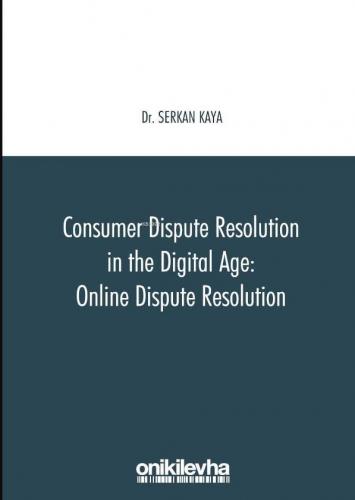9786257899758
560793

https://www.hesapli24.com/consumer-dispute-resolution-in-the-digital-age-online-dispute-resolution
Consumer Dispute Resolution in the Digital Age: Online Dispute Resolution
12.40
In the digital age, with development of information communication and technology (ICT), consumer spending dominates the Gross Domestic Product (GDP). The continuously increasing consumer spending raises the probability of consumer disputes. The traditional litigation used for resolving consumer disputes is often inconvenient, impractical, time-consuming, complex and expensive. This book discusses the strengths and weaknesses of the traditional consumer redress system and questions the judicial approach to the implementation of consumer access to justice. This book evaluates the resolution of consumer disputes and analyses the EU consumer Alternative Dispute Resolution (ADR) and Online Dispute Resolution (ODR) regime seeking for lessons to be learnt by countries where ODR is at its initial stage.(ARKA KAPAKTAN)
Table of Contents
Chapter 1
Introduction
1.1. Introduction
1.2. Aim and Methodology of this book
1.3. Structure of the Book
Chapter 2
The Theoretical Framework of Online Dispute Resolution
2.1. Introduction
2.2. The Popularity and the Need for Modernisation of ADR
2.3. The Advent of Online Dispute Resolution
2.4. The Main Online Disputes Resolution Methods
2.5. The Current Legal Environment of ODR
2.6. Conclusion
Chapter 3
Online Dispute Resolution for Consumer Internet-Related Disputes
3.1. Introduction
3.2. An Overview of Electronic Commerce
3.3. Characteristic of Consumer Disputes Arising from E-commerce
3.4. Consumer Access to Justice
3.5. Contemporary Trends of ODR in the Case of Consumer Disputes
3.6. The EU ODR Platform Resolving Consumer Disputes
3.7. Lesson Learned from the well-established ODR practices
3.8. Conclusion
Chapter 4
Fundamental Principles for the Establishment and Continuation of an ODR System
4.1. Introduction
4.2. Impartiality, Independence and Expertise
4.3. Effectiveness and Efficiency
4.4. Fairness
4.5. Accountability (Transparency) versus Confidentially
4.6. Accessibility
4.7. Security
4.8. Enforcement
4.9. Conclusion
Chapter 5
Arbitrability of Consumer Disputes
5.1. The Concept of Arbitrability
5.2. Positive and Negative Aspects of the Notion of Arbitrability
5.3. Subjective Arbitrability of Consumer Disputes
5.4. Objective Arbitrability of Consumer Disputes
5.5. The Validity of Consumer Arbitration Clauses
5.6. Legal Framework Governing Pre-Dispute and Post-Dispute Consumer Arbitration Agreements
5.7. Conclusion
Chapter 6
Conclusion
6.1. Summary and Findings
Appendix 1 Regulation on Consumer ODR
Appendix 2 Directive on Consumer ADR
Appendix 3 UNCITRAL Technical Notes on ODR
Bibliography
In the digital age, with development of information communication and technology (ICT), consumer spending dominates the Gross Domestic Product (GDP). The continuously increasing consumer spending raises the probability of consumer disputes. The traditional litigation used for resolving consumer disputes is often inconvenient, impractical, time-consuming, complex and expensive. This book discusses the strengths and weaknesses of the traditional consumer redress system and questions the judicial approach to the implementation of consumer access to justice. This book evaluates the resolution of consumer disputes and analyses the EU consumer Alternative Dispute Resolution (ADR) and Online Dispute Resolution (ODR) regime seeking for lessons to be learnt by countries where ODR is at its initial stage.(ARKA KAPAKTAN)
Table of Contents
Chapter 1
Introduction
1.1. Introduction
1.2. Aim and Methodology of this book
1.3. Structure of the Book
Chapter 2
The Theoretical Framework of Online Dispute Resolution
2.1. Introduction
2.2. The Popularity and the Need for Modernisation of ADR
2.3. The Advent of Online Dispute Resolution
2.4. The Main Online Disputes Resolution Methods
2.5. The Current Legal Environment of ODR
2.6. Conclusion
Chapter 3
Online Dispute Resolution for Consumer Internet-Related Disputes
3.1. Introduction
3.2. An Overview of Electronic Commerce
3.3. Characteristic of Consumer Disputes Arising from E-commerce
3.4. Consumer Access to Justice
3.5. Contemporary Trends of ODR in the Case of Consumer Disputes
3.6. The EU ODR Platform Resolving Consumer Disputes
3.7. Lesson Learned from the well-established ODR practices
3.8. Conclusion
Chapter 4
Fundamental Principles for the Establishment and Continuation of an ODR System
4.1. Introduction
4.2. Impartiality, Independence and Expertise
4.3. Effectiveness and Efficiency
4.4. Fairness
4.5. Accountability (Transparency) versus Confidentially
4.6. Accessibility
4.7. Security
4.8. Enforcement
4.9. Conclusion
Chapter 5
Arbitrability of Consumer Disputes
5.1. The Concept of Arbitrability
5.2. Positive and Negative Aspects of the Notion of Arbitrability
5.3. Subjective Arbitrability of Consumer Disputes
5.4. Objective Arbitrability of Consumer Disputes
5.5. The Validity of Consumer Arbitration Clauses
5.6. Legal Framework Governing Pre-Dispute and Post-Dispute Consumer Arbitration Agreements
5.7. Conclusion
Chapter 6
Conclusion
6.1. Summary and Findings
Appendix 1 Regulation on Consumer ODR
Appendix 2 Directive on Consumer ADR
Appendix 3 UNCITRAL Technical Notes on ODR
Bibliography
Yorum yaz
Bu kitabı henüz kimse eleştirmemiş.















